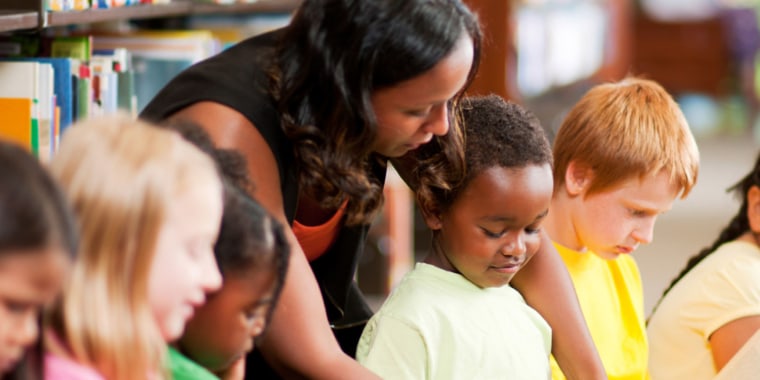Hoping to help your first-grader with reading and writing skills? Here are some basic tips that experts suggest.
Share reading with your child
It's one of the most basic pieces of parenting advice and still one of the most important, even when your child is in first grade: read to and with her. Now that they are in the early stages of becoming a proficient reader herself, this can become more of a shared activity. For example, take turns reading pages of a book, which gives them a chance to show off their skills and allows you to help their sound out difficult words.
Keep reading material handy
Fill your house with a variety of reading materials and make sure that your child sees you and other adults reading regularly, so that they views it as a fun and positive activity.
Visit the local library
Make visits to your local library part of your regular routine. The library is a fun place, especially if you present it to your first-grader as a place of discovery, with unlimited books to read and borrow and activities like story time, author readings, and craft time.
Allow easy access to writing supplies
Make sure that your child has easy access to the tools and supplies they will need to practice the writing skills they are learning. Have a range of supplies on hand to make writing fun, such as different-colored pens, crayons, colored paper, and dry-erase boards.
Encourage writing through lists
Encourage your child to practice writing by making lists. Make sure that writing is not something that is viewed as a just a school activity or homework. Give their reasons to write, for example by making lists. Encourage them to help with the grocery shopping by writing a list. For holidays or birthdays, ask them to write a list of presents they would like, or have their compile a list of the chores they are responsible for.
Show how writing is practical
Show them the practical use of writing by helping their compose short reminder notes at home or letters to other family members. When they see that writing serves a useful purpose your child will be more likely to try it and to initiate writing on their own.
Value your child’s writing
Encourage your first-grader to draw a picture and write a story that goes along with it, using any scribbling, characters, or spelling that makes sense to her. Display the result, as you do their artwork, by posting it on the fridge or framing it and putting it on your desk. This helps their see that you value their writing and think it is important.
Don't correct all spelling mistakes
Don't go overboard in correcting your child's early efforts at writing. In the same way that, when they were learning to talk, you didn't correct every pronunciation error or grammatical mistake, now that they're learning to write, you don't want to inhibit their by focusing too much on what they're doing wrong. If you correct every error, beginning writers will start to close up, so by allowing them more latitude encourages them to view writing as a fun activity and not work.
Make a summer scrapbook
At the start of the school year, make a scrapbook of your first-grader's summer vacation, including photos and items related to activities your child took part in. Ask them to tell you about the places the items came from, including why they were there and what your child enjoyed about that day. Jot down their stories and memories, capturing their exact words as much as possible.
Make a family tree
Make a family tree. Have your child take photos of various family members and glue them onto a drawing of a tree, with a label under each photo explaining that relative's relationship to her.
Always carry reading materials
Never leave home without reading materials, for both you and your first-grader. Always having a book or a magazine on hand for moments like a wait at a doctor's office, a long car ride, or just waiting in the car to pick up a sibling helps your child understand that reading is an enjoyable activity that your child can do at any time.
Play simple word games
Play simple word games with your first-grader. For example, when you're on the road, have their spot words on signs that begin with a certain letter.
Turn rhymes into plays
Choose a favorite rhyme or song and turn it into a play. Talk to your child about the story the rhyme or song tells: What is the story about? What words are most important? What are the characters like? If it's appealing to your child, find some dress-up clothes and props. Then, create the performance! Perhaps film this event to show to your family and friends.
To find out what your first-grader will be learning in English Language Arts class, check out our first grade English Language Arts skills page.
Parent Toolkit resources were developed by NBC News Learn with the help of subject-matter experts, including Joyce Epstein, Director, Center on School, Family and Community Partnerships, Johns Hopkins University; Pamela Mason, Program Director/Lecturer on Education, Harvard Graduate School of Education; Barbara Stripling, Senior Associate Dean, Syracuse University; Elfrieda "Freddy" Hiebert, President and CEO, TextProject; Linda Gambrell, Professor, Clemson University; and Nell Duke, Professor, University of Michigan, and align with the Common Core State Standards.
